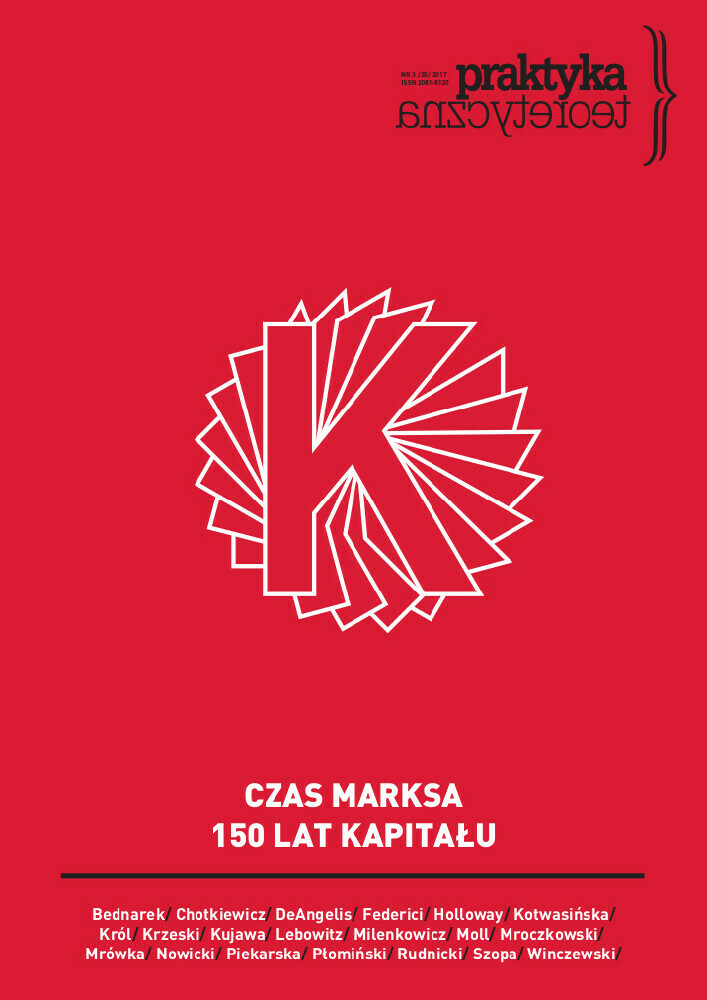Abstract
Although Marx in Capital does not work directly on issues such as gender or family, there is no doubt that Marxist historical materialism has had a profound impact on feminist theory. However, Silvia Federici argues that we need to distinguish between two Marxes, who have different views not only on gender, but also on the forms of class struggle. The first one concealed the problem of housework and reproductive work; for him the class struggle was strictly connected with working in industry. The second Marx, discovered by feminists in the 1970s, provided us with tools that enable us to rethink the particular forms of exploitation that women in capitalist societies are being subjected to.References
Bock, Gisela i Barbara Duden. 1980. „Labor of love/love as labor: On the genesis of housework in capitalism”. W From feminism to liberation, red. Edith Hoshino Altbach. Cambridge, MA: Schenkman Publishing.
Brown, Heather. 2012. Marx on Gender and the Family: A Critical Study. Leiden: Brill.
Cleaver, Harry. 2011. Polityczne czytanie Kapitału. Tłum. Iwo Czyż. Poznań: Wydawnictwo Bractwo Trojka.
Dalla Costa, Mariarosa. 1975. „Women and the Subversion of the Community.” W The Power of Women and the Subversion of the Community, red. Selma James i Mariarosa Dalla Costa. Bristol: Falling Wall Press.
Federici, Silvia. 2004. Caliban and the Witch. New York: Autonomedia.
Federici, Silvia. 2012. Revolution at Point Zero: Housework, Reproduction and Feminist Struggle. New York: Autonomedia.
Fortunati, Leopoldina. 1997. The Arcane of Reproduction: Housework, Prostitution, Labor and Capital. New York: Autonomedia.
Gimenez, Martha E. 2005. „Capitalism and the Oppresion of Women: Marx Revisited.” Science and Society 69(1): 11–32.
Hayden, Dolores. 1985. The Grand Domestic Revolution. Cambridge, MA: MIT Press.
Henninger, Max. 2014. „Poverty, Labour, Development: Toward a Critique of Marx’s Conceptualization.” W Beyond Marx: Theorising the Global Labour Relations of the Twenty-First Century, red. Marcel Van der Linden i Karl Heinz Roth. Leiden: Brill.
Holmstrom, Nancy. 2002. „A Marxist Theory of Women’s Nature.” W The Socialist Feminist Project: A Contemporary Reader in Theory and Politics, red. Nancy Holmstrom. New York: Monthly Review.
Selma, James. 1975. Sex, Race and Class. Bristol: Falling Wall Press.
Marshall, Alfred. 1925. Zasady ekonomiki, t. 1. Warszawa, Wydawnictwo M. Arcta
Marks, Karol. 1951. Kapitał, t. 1. Warszawa: Książka i Wiedza.
Marks, Karol i Fryderyk Engels. 1961. „Ideologia niemiecka.” W MED, t. 3. Warszawa: Książka i Wiedza.
Marks, Karol i Fryderyk Engels. 1962. „Manifest komunistyczny.” W MED, t. 4. Warszawa: Książka i Wiedza.
Marks, Karol. 1979. „Teorie wartości dodatkowej.” W MED, t. 26. Warszawa: Książka i Wiedza.
Marks, Karol. 2011. 18 brumaire’a Ludwika Bonaparte. Warszawa: Wydawnictwo Krytyki Politycznej.
Marks, Karol. 2013. Kapitał 1.1. Rezultaty bezpośredniego procesu produkcji. Tłum. Mikołaj Ratajczak. Warszawa: Wydawnictwo Naukowe PWN.
Mojab, Shahrzad. 2015. Marxism and Feminism. London: Zed Books.
Negri, Antonio. 1991. Marx Beyond Marx: Lesson on the Grundrisse. New York: Autonomedia.
Salleh, Ariell. 1997. Ecofeminism as Politics: Nature, Marx and the Postmodern. London: Zed Books.
Scott, Joan Wallach. 1988. Gender and the Politics of History. New York: Columbia University Press.
Seccombe, Wally. 1993. Weathering the Storm: Working-Class Families from the Industrial Revolution to the Fertility Decline. London: Verso.
License
“Theoretical Practice” seeks to put into practice the idea of open access to knowledge and broadening the domain of the commons. It serves the development of science, thinking and critical reflection. The journal is published in open-access mode under the CC-BY-NC-SA 4.0 license (detail available here: http://creativecommons.org/licenses/by-nc-sa/4.0/). Articles published in the journal may be freely distributed, stored, printed and utilized for academic and teaching purposes without restrictions.
They should not be, however, used for any commercial purposes or be reconstructed into derivative creations. Access to the journal may not be limited or offered for a fee by any third party.
Prospective authors are obliged to fill in, sign and send back the publishing contract compliant with the CC licencing. [PL.pdf, PL.doc, EN.pdf,EN.doc].
According to this contract, authors grant the journal a non-exclusive right to publish their work under the creative commons license (CC-BY-NC-SA 4.0) without any financial obligation on both sides of the contract.
Before submission authors should make sure that derivative materials they use are not protected by copyright preventing their non-commercial publication. Authors are responsible for any respective copyright violations.
